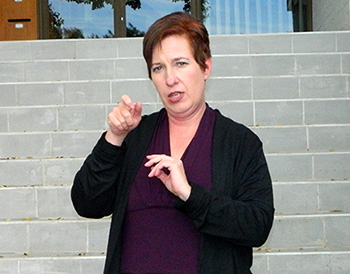Latest News Archive
Please select Category, Year, and then Month to display items
02 January 2025
|
Story Gerda-Marie van Rooyen
|
Photo Supplied
 Leading the research in South Africa is Prof Linus Franke from the Department of Soil, Crop and Climate Sciences.
Leading the research in South Africa is Prof Linus Franke from the Department of Soil, Crop and Climate Sciences.
Scientists are actively pursuing the successful breeding of diploid hybrid potatoes from inbred lines. This is expected to revolutionise potato breeding as it holds the key to rapid genetic progress. It will introduce new varieties for commercialisation through seed. Currently, existing potato variants have a gene that renders self-pollinated seeds infertile.
Prof Linus Franke, an academic in the Department of Soil, Crop and Climate Sciences at the UFS, is leading the research in South Africa. “This technology allows the production of genetically uniform potato seed that is easy to transport and largely disease-free.” He says this differs from conventional breeding whereby only vegetative propagation is possible due to tetraploid varieties in potatoes. It also risks carrying pests and diseases from one generation to the next – leading to the accumulation of pests and diseases with each round of multiplication.
Seed innovation
Prof Franke explains that Solynta BV, a seed company based in the Netherlands that produces potato varieties that can be grown from seed, has included South Africa in their research efforts because it is one of Africa’s largest producers and exporters. Through his academic relationship with Wageningen University and Research, a Dutch institution renowned for its agricultural endeavours and food production, the UFS became involved in researching hybrid potatoes grown from seed.
Diploid seeds containing two sets of chromosomes allow easier gene manipulation to increase predictability and speedier genetic progress. The breeding approach enables the incorporation of tolerance to pests, diseases, abiotic stresses (cold, heat, drought) and other desired genetic traits.
Although Prof Franke is optimistic about this research, he is not blind to disadvantages. “Potato seeds are tiny and have little energy reserves, making it harder to grow potatoes from seed than from tubers.” He says potatoes from seed will take longer to cultivate than tubers, as farmers need to grow plantlets from seeds first, adding six weeks to the growing period. “It is possible that commercial farmers can grow potatoes directly from seed. Alternatively, perhaps more likely, specialised growers will produce tubers of potatoes from seed; these tubers are then sold as seed tubers to other potato farmers, who then continue their normal practices of producing potatoes for the market from tubers.”
Financial benefits
Prof Franke says farmers have reason to get excited. “Seed potatoes will reduce input costs, as varieties with enhanced tolerance to pests and diseases require less pesticides. Planting one hectare of potatoes requires three to four tonnes of potato tubers, but only one 25 g packet of potato seeds.” Since potatoes are a more valuable commodity than maize, this technology might also increase farmers’ income potential.
Martie Miranda one of only 10 SATI accredited sign language interpreters in South Africa
2015-04-23

Martie Miranda
Photo: Stefan Lotter |
The University of the Free State is privileged to have one of the top South African Sign Language (SASL) Interpreters as a staff member at the Unit for Students with Disabilities (USD).
Martie Miranda recently passed the accreditation exam of the South African Translators Institute (SATI), joining Dr Philemon Akach, previous HOD of the South African Sign Language Department of the UFS, in becoming one of only 10 SASL interpreters to be SATI accredited.
SATI is a professional association for language practice professionals in South Africa. Voluntary accreditation is offered at a professional level, ensuring a high standard of language practice. The system has become widely recognised, and is used as a recommendation or prerequisite for job applications by a number of institutions, including the South African government, particularly after the infamous ‘Jantjies incident’ with the funeral service of the late President Nelson Mandela.
Martie, a proud Child of Deaf Adults (CODA), has 18 years’ experience in SASL interpreting, lip speaking interpreting, and community interpreting as well as 15 years’ experience of conference and seminar interpreting. She boasts a Level 2 Advanced Interpreting qualification, and she has been mentoring Level 1 SASL interpreters for the past six years. Her extensive interpreting experience on a national and international level also includes Deafblind interpreting as well as Court and Legislature interpreting. She has interpreted three theatre productions, and has been coordinating the SASL services at the UFS since January 2009. She is responsible for the student management of all the hearing-impaired students at the USD.
Martie completed her BML degree (cum laude) at the UFS Business School in 2013, and received the award for top achiever in the programme during her final year. She will enrol for her MBA at the UFS Business School in July 2015.